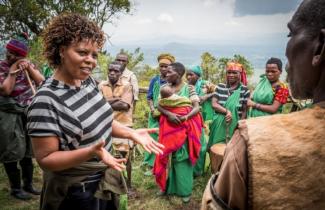Protected areas, in their many forms, are critical land and seascapes to conserve ecosystems and the variety of species that inhabit them. They can also be powerful forces for change. A community conservancy may secure land rights, improve local governance, and generate new livelihood opportunities. National parks that engage local communities can have a stabilizing influence on an area and can help attract private investment and create jobs. However, without safeguards for conservation activities and effective engagement with local communities, there is an increased risk that some surrounding communities can be marginalized or worse off following such development interventions. To ensure the best outcomes are achieved, USAID acknowledges the central role that strong safeguards combined with local engagement, ownership and meaningful participation play in ensuring conservation activities contribute to long term local and regional development.
To fulfill USAID’s commitment to the communities with which it works, USAID applies four safeguards within its support for national parks and other protected areas:
- Local communities are consulted regarding the activity and potential impacts, rising to free, prior and informed consent for impacted Indigenous Peoples consistent with the USAID Policy on Promoting the Rights of Indigenous Peoples.
- Consider the impact of an activities park and protected area’s support on affected communities, with a particular focus on land and resource claims.
- In the context of the specific USAID activity and objectives, rangers and similar personnel are trained and monitored regarding safe and fair application of the law, including respect for human rights and avoiding intimidation or unnecessary use of force.
- An implementer-led grievance and redress mechanism exists for reporting human rights abuse, misconduct and other grievances.
These safeguards are directed by Congress for FY 2020 and later funds. Safeguard requirements are incorporated into new awards and are reflected in the environmental compliance process for both new and existing awards. USAID takes a project- and fact-specific approach that considers the potential impacts inherent to each activity, including the type of support provided and the experience of the communities involved.
The technical support documents for implementing these safeguards are available to help USAID staff and implementing partners apply these requirements and avoid or mitigate social risks associated with conservation activities for parks and protected areas.
Technical support documents are provided under each of the four safeguards listed below.
- Local communities are consulted regarding the activity and potential impacts, rising to free, prior and informed consent for impacted Indigenous Peoples consistent with the USAID Policy on Promoting the Rights of Indigenous Peoples.
Key resources:- Community Engagement Guide
- Community Engagement for USAID Protected Area Activities: How to Guide
- USAID Policy on Promoting the Rights of Indigenous Peoples
- Optional Toolkit on Identifying Indigenous Peoples
- USAID Guidance on Monitoring Free Prior and Informed Consent
- The Concise Guide for Monitoring Engagement and Verifying Free, Prior and Informed Consent
- Free Prior and Informed Consent 360 Monitoring Tool
- Consider the impact of an activities park and protected area’s support on affected communities, with a particular focus on land and resource claims.
Key resources: - In the context of the specific USAID activity and objectives, rangers and similar personnel are trained and monitored regarding safe and fair application of the law, including respect for human rights and avoiding intimidation or unnecessary use of force.
Key resource: - An implementer-led grievance and redress mechanism exists for reporting human rights abuse, misconduct and other grievances.
Key resource:

Jason Houston for USAID
